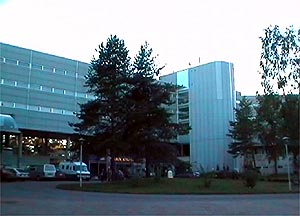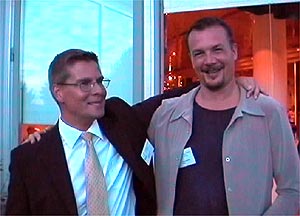Barely alive
- but kicking in Pori
EDXC 2002 Conference
by Mika
Mäkeläinen
DXers from 11 countries and station
representatives from eight countries took part in
the annual conference of the European DX Council
(EDXC) in Finland on August 16-18, 2002. Dubbed
the DX Odyssey 2002, the conference was coupled
with the summer meeting of the Finnish DX Association
(FDXA), which lifted attendance figures to 130,
the highest in many years.
 |
| Spa Hotel Yyteri in Pori,
Finland |
DX Odyssey
2002 was held in Pori, a familiar town to everyone
interested in shortwave. The shortwave center of
Pori,
including the shortwave transmitters used by Radio
Finland and the most powerful AM transmitter in
Finland, is located just 15 kilometers away from
the conference venue, Spa
Hotel Yyteri.
The
hotel in turn is situated on one of the best beaches
in Finland, but despite the warm and sunny weather
many of the participants seemed to prefer DXing
in a murky hut and presentations in a sweltering
conference room to laying on the beach or dipping
into the exceptionally warm (+25 degrees C) sea.
 |
| Frans Vossen (left) from RVI
recording the welcome message of Luigi Cobisi
(right), secretary-general of the EDXC, as he
is handing a historical flag from Italy to Risto
Vähäkainu (center), head of the organizing
committee. |
The first
problem was of course getting there. Finland is
not exactly central Europe and Pori on the western
coast is not the heart of Finland - located a four-hour
bus or train ride (or a short but expensive flight)
away from the capital Helsinki. Nevertheless, DXers
from 11 countries managed to get to Pori, with Bob
Padula from Australia traveling the most distance.
Gerald Kercher and Lewis Coulborn from the U.S.
took part, the rest of the participating hobbyists
being from around Europe.
Testing receivers
and antennas
The conference
kicked off with a brief flag ceremony on Friday,
August 16, at 17:30. The first part of the program
was an introduction to a receiver test to be conducted
over the weekend. Martti
Karimies, Tarmo Kontro and Vesa-Jussi Rinkinen
had collected an impressive range of professional
and semi-professional receivers that participants
were able to use over the weekend.
 |
| The listening shack with several
expensive professional receivers was used by
many DXers over the weekend. |
The receivers
were tested and compared under the problematic reception
conditions of Pori, where the shortwave center causes
extremely high levels of interference. Results
of this test were reported in the end of the conference,
and a more detailed article on the tests is due
to be published later on DXing.info.
Andrew Janitschek of Radio
Free Asia was the first broadcaster to introduce
his station, after which Jim
Solatie held the World's best identifying
contest. Best at least in terms of prizes; with
champagne labelled by Radio Favorit from Bulgaria,
a CD collection of station
identifications (on sale now through DXing.info)
and others - all of it for the winner. I should
mention that my wife thought that the champagne
was actually pretty good...
 |
| Two DXers from Russia; Alexander
Beryozkin (left) from St. Petersburg and Dmitri
Mezin from Kazan. |
Later in the evening a welcoming
reception with drinks on the house was the
first of its kind in the long tradition of Finnish
DX conferences. The reception was held on a camping
ground hosting a huge gathering of motorists. Those
who stayed late were in for a surprise. The gates
were closed, probably to prevent the motorists from
flooding into the hotel grounds. Then the options
were to either take a loooong midnight walk around
the entire area or climb over a barbed wire fence.
Just guess what a drunk Finn would choose to do...
surprisingly few ripped trousers were seen on the
following day.
Media publicity
near and far
The conference gained attention
both in the local media and in the international
shortwave scene. The leading regional newspaper
Satakunnan Kansa wrote a large article on DXing,
and YLE TV News covered the conference, concentrating
on the decline of shortwave, in one of its evening
newscasts with an audience of half a million.
 |
| Engin Asena and Osman Erkan
from the Voice of Turkey |
Scandinavian
Weekend Radio (SWR) was heard both in the auditorium
and on the airwaves. Esa Saunamäki and Trevor
Twyman held a presentation of this station which
is the first and only private shortwave station
in Scandinavia. SWR also had a 24-hour special transmission
on Saturday, August 17.
The Finnish Broadcasting Company
(YLE) reported on the conference both locally in
Finnish and on shortwave in English. A one-hour
special broadcast from the conference venue consisted
of interviews conducted by Christina Rockstroh and
a panel discussion hosted by Juhani Niinistö,
head of Radio
Finland.
Also on Saturday, German Rhein-Main-Radio-Club
chairman Harald Gabler presented his vision for
DX
Channel, a combination of radio and internet
services for DXers. An FM expert session hosted
by Jukka Kotovirta introduced some of the achievements
and experiences of Finnish FM DXers.
Seeing is believing
 |
| The shortwave center in Pori
welcomed two bussloads of DXers |
In the afternoon, participants
took a tour of the Pori shortwave center in Preiviiki,
Pori. The center is operated by Digita,
which is responsible for radio and television transmitters
in Finland. Digita is owned by the Finnish Broadcasting
Company (YLE) and Télédiffusion de
France (TDF).
For DXers, figures are what count...
As we learned from director Esko Huuhka, the Pori
shortwave center was built in 1988, and covers an
area of 40 hectares. The transmitter building itself
is 3347 square meters. There are five shortwave
transmitters (3 x 500 kW, 1 x 250 kW and 1 x 100
kW) and a 600-kilowatt mediumwave transmitter operating
on 963 kHz. All antennas are directional.
 |
| This is where the shortwave
transmissions of Radio Finland come from |
Program is fed from YLE studios
in Helsinki by four links, so a maximum of four
program feeds can be transmitted simultaneously.
Seeing the antennas that we
all are used to listen to was an interesting experience,
although to an untrained eye, all antennas all over
the world look more or less alike.
Later on Saturday, Airto Vienola
guided participants to make computer audio files
and Magnus Wiberg from the Swedish Teracom
explained about the promises of DRM, Digital Radio
Mondiale. The AM DX Show hosted by Hannu Niilekselä,
Antti Aaltonen and Hannu Tikkanen gave an interesting
insight into the development of MW DXing in Finland
over the years. Yours truly gave a presentation
on DXing.info, and Paolo Morandotti told the audience
about a portal developed by EDXC. And to enlarge
the sphere of DX activities, Jarmo Salmi and Simo
Soininen gave a presentation on collecting radio-related
items such as stamps, closing the afternoon session.
 |
| Jim Solatie and Hannu Piirainen
needed to cool off during the banquet |
The evening was a mix of FDXA
and EDXC traditions; a hefty banquet at the hotel
restaurant represented the pan-European contribution,
while the FDXA awards ceremony (presented by FDXA
chairman Juha Ignatius and Risto Vähäkainu)
and the DX Auction (by Raimo Kaksonen and Jarmo
Salmi) were irreplaceable ingredients of the Finnish
tradition.
This year the FDXA awards went
to Hannu Tikkanen, Hannu Asikainen, Håkan
Sundman, Bob Padula, YLE Radio Finland and the Scandinavian
Weekend Radio. A special prize was awarded to Mika
Palo for his activity in promoting DXing in the
media. A lottery, with winners drawn by Valentina
Jolkver from Deutsche Welle, was also held with
receivers and other items donated by the many sponsors
of the conference. Andrew Janitschek took home the
top prize, a Sangean ATS-505 receiver.
From Ethiopia to
Turkey
Sunday morning began with a look
at radio history. Mika Palo, all the way from Portugal,
told the story of Radio Voice of the Gospel in Ethiopia
and also presented an assessment of Shortwave Guide,
a new book published recently by the WRTH.
 |
| Cheers - or kippis as they
say in Finland. The conference was a success,
believes FDXA chairman Juha Ignatius. |
Yours truly chaired the forum
for international broadcasters. Present were Arto
Mujunen (IBB), Andrew Janitschek (RFA), Osman Erkan
and Engin Asena (Voice of Turkey), Frans Vossen
(R Vlaanderen Int), as well as Waldemar Krämer
and Valentina Jolkver (both Deutsche Welle).
The future of shortwave broadcasting
was debated, but Janitchek assured that shortwave
will definitely survive as a medium. -If you want
to reach people in Burma, how many have access to
the Internet? Probably as many as there are people
in this room, Janitcheck said.
Many broadcasters are however
closing their services, among them Radio Finland
(see news
and community for details). Osman Erkan said that
Voice of Turkey also plans to close some language
services, including Kazakh, and put more emphasis
on satellite delivery.
 |
| The LP antenna in Pori can
be directed anywhere. |
Frans Vossen reminded that radio
stations shouldn't make hasty conclusions based
on the feedback they get. Even though it is DXers
who write to the stations, there are countless other
listeners. -Why would anyone need to write to a
radio station, Vossen said, and told that once when
he was still a listener and not a broadcaster, and
lived in Africa, he nearly got arrested for getting
too much mail from Russia. Radio Moscow at that
time was not just any international broadcaster.
As for Radio Vlaanderen, Vossen
said that a new website would be published in October,
but shortwave will continue to be one alternative
channel for the audience. Krämer told that
across the border in Germany DW is celebrating 50
years next year (you can expect new QSLs) and the
station plans to move from Cologne to a new broadcasting
house in Bonn in February 2003.
Bleak future for
EDXC
Slightly past midday Sunday,
August 18, the closing session included the EDXC
club meeting. The general feeling was that EDXC
is losing ground among European DX clubs. -The future
of EDXC doesn't look too good, if the present trend
continues. In addition to the land list, the annual
EDXC conference is the only significant activity
at the moment. The number of member clubs is declining,
says Risto Vähäkainu, previous secretary-general
of the EDXC.
But, to end the official conference
program on a happier note, Risto Vähäkainu
held a humorous music quiz, which was won by Alan
Pennington and Jorma Huuhtanen. After closing the
conference officially at 14:00, some 20 participants
took advantage of the possibility to extend the
conference by a couple of more days by participating
in a tour of Estonia, including a visit to the Estonian
Radio in Tallinn. That is where the only real setback
of the conference took place as Frans Vossen of
RVI badly injured his knee and needed to stay in
hospital in Tallinn for a couple of days before
he was taken for an operation in Brussels.
-But the dinner at Olde Hansa
restaurant in Tallinn was the best experience of
the conference, Risto Vähäkainu said.
- And generally on the conference, I was very happy
with the program and the presenters, Vähäkainu
sums up.
published on September
2, 2002
Additional snapshots
from the EDXC 2002 conference:
 |
Luigi Cobisi (left) and Risto
Vähäkainu, the present
and former heads of the European DX Council |
 |
| YLE TV News crew filming Martti
Karimies at the listening shack (photo ©
by Tarmo Kontro) |
 |
| Pori shortwave center in Preiviiki |
 |
| Control room at Preiviiki |
 |
| One of the BBC (Brown Boveri)
500-kW transmitters... |
 |
| ... currently running at 340
kW ... |
 |
| ... and operating on the frequency
of 15400 kHz |
|